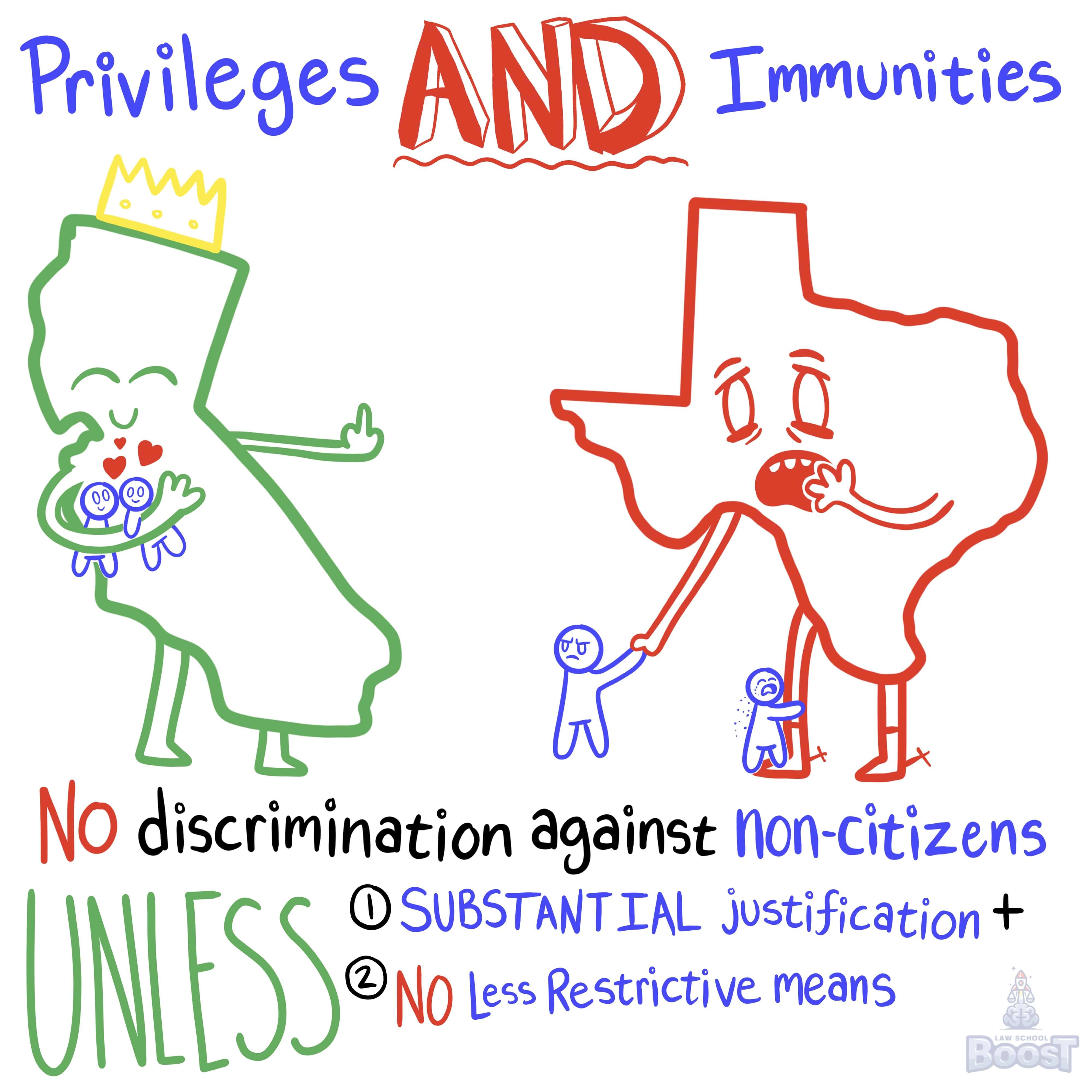🇺🇸
Constitutional Law • Privileges and Immunities
CONLAW#049
Legal Definition
The Privileges and Immunities Clause of Article IV prohibits discrimination by a state against non-state citizens (of the state)—corporations and aliens are not protected—as to "fundamental rights". A state law discriminating against non-citizens in the exercise of fundamental rights may only be valid if the state has a substantial justification for the different treatment and there are no less restrictive means to solve the problem.
Plain English Explanation
Imagine you live in one state and decide to visit a neighbor state for a trip. When you get there, you find out you can't do things locals can do, like using certain parks or getting a local job, just because you're not from there. That doesn't seem fair, right? The Privileges and Immunities Clause is a rule saying states have to treat visitors from other states pretty much the same as their own residents, especially when it comes to important rights like working, owning property, etc. States can't just make up harsh rules that only apply to out-of-staters unless they have a very strong reason, and even then, they need to make sure they're not going too far. This rule exists to make sure all Americans feel welcome and treated fairly in every state, making the country more united and ensuring everyone has the same basic opportunities, no matter where they are.
Hypothetical
Hypo 1: Bob, a resident of Hypofornia, decides to apply for a job in New Hypoland. The job is open to everyone, but New Hypoland has a law that says out-of-state applicants must pay a higher application fee. Bob argues this is unfair. Result: Under the Privileges and Immunities Clause of Article IV, New Hypoland's law discriminates against Bob based on his state residency, affecting his fundamental right to seek employment. Unless New Hypoland can show a substantial justification for the higher fee and that no less restrictive means are available, the law would likely be deemed invalid.
Hypo 2: Sam, from New Hypoland, wants to buy property in Hypofornia. Hypofornia has a statute that requires non-residents to pay double the property tax rate that residents pay. Result: This situation falls under the Privileges and Immunities Clause of Article IV, as it discriminates against Sam based on his residency, touching upon his fundamental right to own property. Hypofornia would need to demonstrate a substantial justification for the discriminatory tax, which is unlikely, making the statute potentially unconstitutional.
Hypo 3: Bob visits a state park in New Hypoland, where he's charged a higher entry fee than residents. Result: The higher fee for out-of-state visitors could be challenged under the Privileges and Immunities Clause of Article IV, as it discriminates against Bob. However, states sometimes justify such fees by arguing the need to fund park maintenance primarily from state residents' taxes. If the fee difference is reasonable and not overly restrictive, it might be upheld.
Hypo 2: Sam, from New Hypoland, wants to buy property in Hypofornia. Hypofornia has a statute that requires non-residents to pay double the property tax rate that residents pay. Result: This situation falls under the Privileges and Immunities Clause of Article IV, as it discriminates against Sam based on his residency, touching upon his fundamental right to own property. Hypofornia would need to demonstrate a substantial justification for the discriminatory tax, which is unlikely, making the statute potentially unconstitutional.
Hypo 3: Bob visits a state park in New Hypoland, where he's charged a higher entry fee than residents. Result: The higher fee for out-of-state visitors could be challenged under the Privileges and Immunities Clause of Article IV, as it discriminates against Bob. However, states sometimes justify such fees by arguing the need to fund park maintenance primarily from state residents' taxes. If the fee difference is reasonable and not overly restrictive, it might be upheld.
Visual Aids



